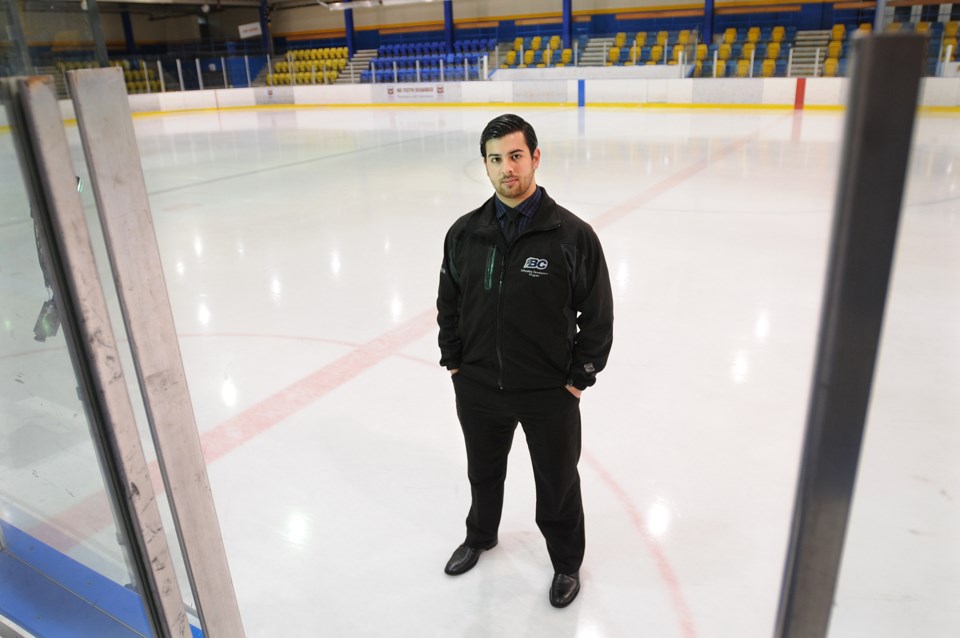During an atom rep game at Kerrisdale Cyclone Taylor Arena on a Friday night, a shot deflected over the head of the referee and grazed the out-of-bounds netting before bouncing loudly off the glass and back onto the ice.
Two coaches on competing benches shouted at the officials, the oldest who’d only turned 14 a week earlier and was only a few years older than the rep players on the ice.
From across the rink, the coach whose team was on defence threw his arms in the air. “It hit the net!”
He was right. But since the whistle wasn’t blown, play continued.
Watching from a corner of the near-century-old rink, Vancouver Thunderbirds Amateur Hockey Association assistant referee in chief Dan Hanoomansingh made a few notes. He was supervising the game as part of the T-Birds three-year-old mentoring program to help develop novice officials.
READ PART I: Vancouver hockey refs lend hand to young peers
Linesmen and referees with only one year’s experience are more effective than older peers who haven’t been shadowed on the ice or supervised from the stands, said Hanoomansingh. The attrition rate has also dropped slightly, meaning fewer teens are being driven away from the job.
After the peewee game (in which the first period lasted 20 minutes, eight minutes too long) the referee and two linesmen were told what they did well — one made a deliberate wash-out sign at a clutch moment when fans were certain there was a goal — and what they didn’t — failing to stop play when the puck went out of bounds, for example.
“That’s primarily your job to catch that,” Hanoomansingh, 21, told the two linesmen. He praised them and also explained the reasons behind his feedback. “I don’t want him [the referee] looking up into the sky for the puck. He’s watching the players and the puck went out right behind him.”
Jeffrey Hemlin, 14, started officiating games last season. Also a bantam rep player for the T-Birds, the Grade 8 student at Hamber secondary signed up to wield the whistle to make a little cash. As a 12-year-old player, he said he saw a referee cry because of abuse from the stands and benches.
The pressure and outrage can be overwhelming, but Hemlin said a good official will withstand the burden of making a ruling — like other decision-makers.
“You have to be unbiased. It’s almost like being a judge,” he said, adding that it takes work to cope with the heated scrutiny of spectator criticism and still stay focused. “You just have to face it head on. That’s what they teach you.
“Let’s say there is a trip and you didn’t see it. The fans will go crazy, the coach will go crazy. You have to stand there and take it. You didn’t see it. You have to fight for you.”
Some of the worst heckling Hemlin heard came after what he considered a “dirty” hit from behind and for which he ejected the peewee player.
“Don’t crack under pressure — you have to stand for your call,” he said. “Some coaches get angry, some yell you. It’s pretty harsh.
“They teach you, if a coach ever yells at you for something like that, you go up to them and say, ‘I don’t want people getting injured. Do you?’”
Trevor Boudreau created the Western Canada Referee School after a 13-year career as a WHL and AHL official and is also the referee in chief for the T-Birds, where he works with Hanoomansingh. He said the passion Canadians feel for hockey is an important aspect of the country’s national winter sport.
“Hockey is a game of emotion game so we don’t want to take that emotion out of the game. That’s what makes it the best game in the world,” said Boudreau. “That’s where the confidence comes in for referees to know they’re doing the right thing. Having an adult — a parent or maybe even one you’ve had as a coach — tell you you’re wrong when you’re 12, 13 or 14 years old, is very difficult.”
Teaching confidence begins with knowing the rules of the game, said Boudreau. Applying that knowledge, effective communication skills and correct on-ice positioning are the backbone to good officiating. But little can prepare a young referee for personal attacks and verbal abuse, which are some of the reasons the Vancouver Island Amateur Hockey Association earlier this month proposed banning all spectators from all minor games over the one weekend.
In the worst cases, spectators wait outside the locker room to berate officials or launch racist, personal attacks, or even “been told to go die,” as one 17-year-old told the broadcast news last week.
The Thunderbirds mentoring program is unique in the province for an association its size. Thousands of players are scheduled in as many as 140 games a week, including league matches and tournament play. Keeping a roster of good referees is crucial.
Hemlin, a second-year T-Bird official and bantam rep player, said confidence goes a long way to maintaining control in the rare occasion a spectator or coach loses it.
“In reffing, you have a lot of power,” he said. “You can kick people out. It’s a good thing to learn.”



